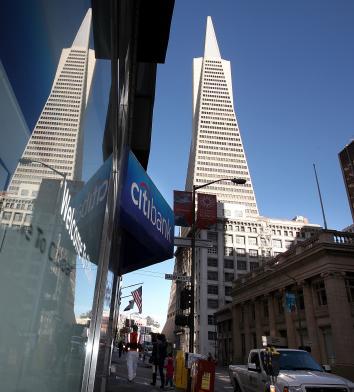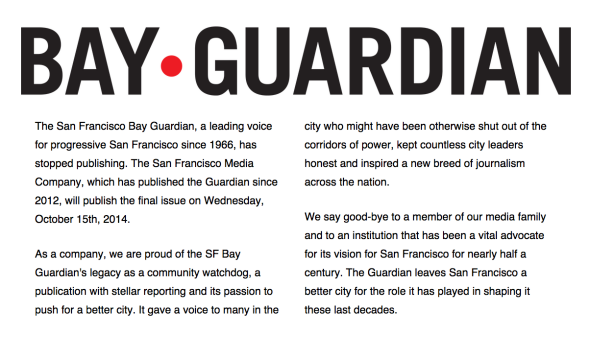Another alt-weekly is dead. But this one wasn’t just another alt-weekly. It was the San Francisco Bay Guardian, one of the most venerable, staunchly independent, and defiantly weird of America’s great alternative weekly newspapers.
The paper, founded in 1966, is shutting down for “financial reasons,” the San Francisco Chronicle reported on Tuesday. The decision was made by San Francisco Media Co., the parent company that bought it in 2012 from its founder, Bruce Brugmann. “It is the hardest decision I’ve had to make in my 20-year newspaper career,” the San Francisco Media Co.’s publisher, Glenn Zuehls, said in a statement. A notice on the Bay Guardian’s website says the final issue will be published on Wednesday, although one of the paper’s fired leaders vowed to SFist that it will “live on in some form.”
The loss of the paper in its current incarnation may not deal a great blow to San Francisco. The Guardian, like many alt-weeklies, had been sliding for years as readers and local advertisers turned from print media to the Web.
Over the decades, though, the Guardian as an institution had come to stand for something more than just convenient concert listings, seamy classified ads, and snarky coverage of the local political scene. It was an embodiment of a certain vision of the city—a vision of San Francisco as a haven for artists, immigrants, eccentrics, hobos, bohos, gays and lesbians, and any extant members of that perennially endangered species, the local working-class family.
Today, as the city’s booming technology industry drives housing prices beyond the means of even the upper-middle class, that vision has begun to take on a sepia tone.
It was, in many ways, Brugmann’s vision. An inveterate gadfly, he wielded the Guardian as a bullhorn in his endless battles with the city’s business interests, real-estate developers, and his personal bête noire, the Pacific Gas and Electric Co. The paper also reflected the old-school leftist ideology of longtime editor Tim Redmond, who left in 2013 after 30 years rather than acquiesce to the new owners’ plans to slash editorial staff. It was a brawling, muckraking paper whose reporters doggedly pursued injustice wherever their editors agreed it existed—which is to say, wherever the perpetrators were rich or powerful or aligned with the forces of capitalism.

Photo by Justin Sullivan/Getty Images
PG&E, which Brugmann saw as an illegitimate private monopoly run at the public’s expense, was not the only target. In the 1960s and ’70s, the paper led a long-running activist campaign against high-rises and new public transit lines in the city’s downtown, which it decried as “the Manhattanization of San Francisco.” In the 2000s it was home to investigative reporter A.C. Thompson, whose Guardian stories were credited with exonerating two local men wrongly convicted of murder.
It was also the purveyor of such hard-hitting features as an annual special issue on nude beaches.
The Guardian’s politics were often glossed as progressive, but critics reckoned that was a misnomer. Progress in the sense of modernization or urbanization had little place on its agenda. It could actually be rather reactionary in its defense of what it saw as San Francisco’s historic character. In a city that leaned left to begin with, even former employees admit the Guardian’s editorials often amounted to “preaching to the choir.”
That predictability left it vulnerable to competition from upstart rivals, most notably the SF Weekly, which at times leaned libertarian but was generally more catholic in its outlook. (Former Slate media columnist Jack Shafer was the Weekly’s editor for a brief period in the mid-1990s. Now at Reuters, Shafer wrote an astute piece last year about the forces behind alt-weeklies’ long decline.)
In the 2000s, the rivalry flared into open combat, with the Guardian suing the Weekly for selling ads below cost in a bid to drive the Guardian out of business. The case dragged on for years in what the New York Times’ David Carr called “one of the last great newspaper wars.” The Guardian kept winning in court, but the Weekly and its corporate owners refused to give up—or pay up. At one point the Guardian got so frustrated that it seized two of the Weekly’s delivery vans.
In the end, they both lost. Locked in brutal battle with one another, they failed to meet the greater challenge of the media’s move online, which has punctured the business models of newspapers nationwide. The young readers who once turned to alt-weeklies now turned to blogs.
Many of the alt-weeklies that are now failing in cities around the country will scarcely be mourned. While they trained generations of young reporters and occasionally produced inspired journalism, most were formulaic copies of a handful of innovators like the Village Voice and the Chicago Reader. The Bay Guardian was never quite in that class, but it was a genuine article nonetheless, capturing sides of the city’s character that the broadsheet Chronicle overlooked.
“For all its bluster, the Guardian did a lot of important civic journalism, and a lot of investigative journalism,” said Tali Woodward, who wrote for the Guardian from 1999 to 2006 and is now director of the Master of Arts program at the Columbia Journalism School. “It was the opposite of today’s blog-heavy, commentary-style journalism in a lot of ways, because even though it had a viewpoint and was very political, it was really a reporter’s paper.”
Even one of the Guardian’s former sworn enemies couldn’t muster any joy in the news of its passing. “I feel weirdly bummed out,” admitted Tommy Craggs, the editor in chief of Deadspin, who wrote for the SF Weekly from 2002 to 2006. “It’s just shitty to see what’s happening with alt-weeklies.”
Years ago, Craggs gleefully poured gas on the Weekly/Guardian conflagration with a column in which he subjected a hand-written letter from Brugmann to psychoanalysis by a local graphologist. Yet the Guardian’s demise had him feeling uncharacteristically wistful on Tuesday. “It should have been a fun rivalry,” he said, “but it had a nastiness behind it, especially on the Weekly’s side.”
The saddest thing about the Guardian’s downfall is that the paper has faded from relevance at a time in San Francisco’s history when the high-flying tech sector is threatening to engulf everything about it that the Guardian and its loyal readers held dear. There is a backlash transpiring in the streets, on blogs, and in magazines. For once, the Guardian is not leading the charge.
